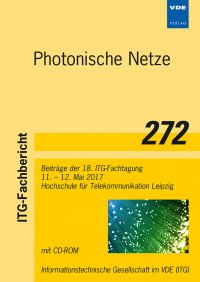Delayed Frame Repetition for Free Space Optical Communication (FSO) Channel
Conference: Photonische Netze - 18. ITG-Fachtagung
05/11/2017 - 05/12/2017 at Leipzig, Deutschland
Proceedings: Photonische Netze
Pages: 5Language: englishTyp: PDF
Personal VDE Members are entitled to a 10% discount on this title
Authors:
Shrestha, Amita; Giggenbach, Dirk (Deutsches Zentrum für Luft und Raumfahrt e.V., Münchner Str. 20, 82234 Weßling, Germany)
Hanik, Norbert (Technische Universität München, Theresienstrasse 90, 80290 München, Germany)
Abstract:
Free space optical communication is gaining interest because of its various advantages like high data rate, high power efficiency, no license regulation etc. However, one has to overcome the challenge of distortion and fading caused by atmospheric turbulences and bad weather conditions. Free space optical communication channel is a time variant channel. Sometimes, the channel has a very good condition and sometimes atmospheric condition gets very bad. Variable data rate is an efficient solution to cope with such situations. The system would run at maximum data rate in good conditions and can be adapted to work at lower data rate in worse situations. This paper discusses about one of the techniques to lower the data rate called Delayed Frame Repetition (DFR) for fading channels. It reduces the user data rate while maintaining the same channel data rate. The basic idea is to retransmit the data after a delay which is greater than fading length of the channel. Similar to spatial diversity systems, different combining techniques like Selective Combining (SC), Maximum-Ratio Combining (MRC) and Equal-Gain Combining (EGC) are studied. Numerous simulations are presented for MRC technique considering thermal limited PIN detector as a receiver, and for channel modelling artificially generated power vectors that are based on real measurements are used. Overall results show that DFR can be very useful for fading channel. MRC being the most efficient combining technique, it is used for evaluating the performance of DFR for different channel conditions with good, medium, bad scintillation indices, and different delays between retransmitted frames.


